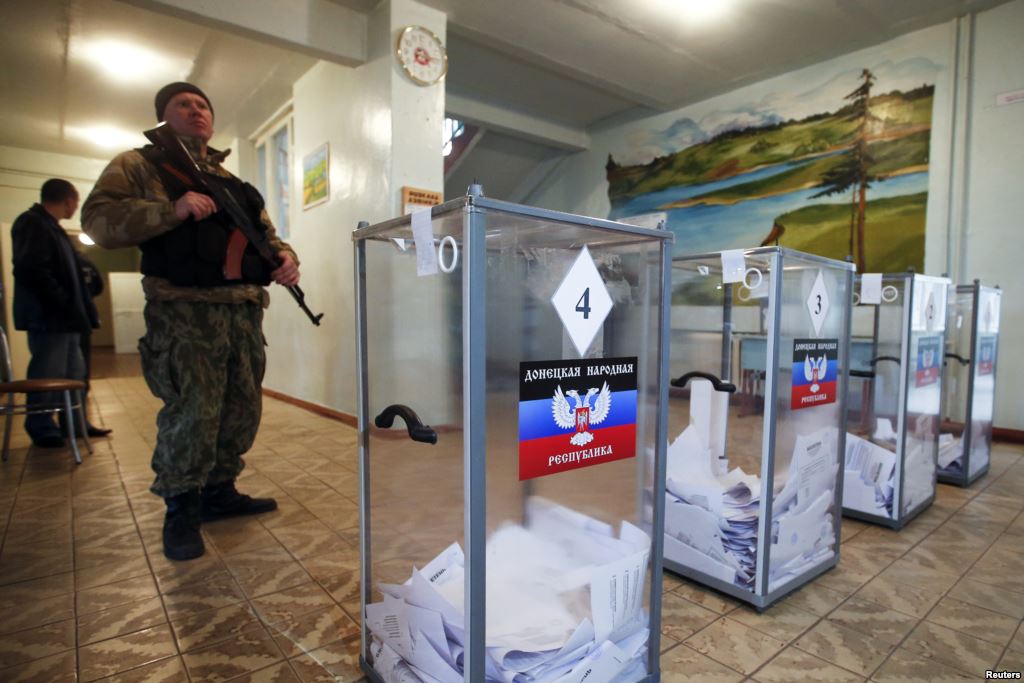
Donetsk, Luhansk ‘People’s Republics’ Seek International Legitimization Through Local Elections (Part One)
Publication: Eurasia Daily Monitor Volume: 12 Issue: 96
By:

The possible international recognition of “elections” staged in the Donetsk and Luhansk “people’s republics” (“DPR, LPR”) is one of the major innovations of the Minsk Two armistice agreement on Ukraine. It is Moscow’s innovation, with Germany and the Organization for Security and Cooperation in Europe (OSCE) on board.
From 1991 to date, armed secessionist authorities in Transnistria, Abkhazia, South Ossetia and Karabakh staged numerous “elections.” None were ever recognized internationally as valid. The OSCE and other international organizations declined even to monitor those elections, so as to avoid lending them even a semblance of legitimacy. Moldova, Georgia or Azerbaijan were never asked to accept the results of elections staged in those secessionist territories. This is now changing in Ukraine’s case, as a consequence of Russia’s war against that country.
Under the February 12 agreement (Minsk Two), Ukrainian and Donetsk-Luhansk forces must, first, withdraw to certain distances on either side of the demarcation line. Whereupon “On the first day following the withdrawal, to start the dialogue on the modalities of holding local elections, in accordance with Ukrainian legislation,” in the Donetsk-Luhansk territories (article 4). The local elections are about legitimizing the authorities on the level of districts and municipalities (Osce.org, February 12).
In parallel with that “dialogue,” Kyiv must negotiate with Donetsk-Luhansk about “de-centralizing” Ukraine generally and about a “special status” for Donetsk-Luhansk in particular (article 11). The modalities of holding local elections there shall also be “discussed and agreed” by Kyiv with representatives of those territories. Following such an agreement, “Elections shall be held in compliance with the relevant OSCE standards and monitored by the OSCE’s Office of Democratic Institutions and Human Rights (ODIHR)” (article 12) (Osce.org, February 12).
The Minsk diplomatic process has, to some extent, legitimized the “DPR-LPR” and their Moscow-installed leaderships, but only de facto. Local elections are intended to legitimize them politically and even from a purely formal “democratic” standpoint. The secessionist authorities are pre-programmed to win elections in the existing circumstances. Kyiv is supposed to consent, actively or passively, under the Minsk agreement and the follow-up process in the Contact Group.
Elections staged by the Kremlin’s proxies cannot conceivably conform to OSCE/ODIHR standards. Russia has disabled this organization from monitoring elections in Russia itself. Yet the OSCE/ODIHR is supposed to prepare the DPR and LPR for holding elections that could then be recognized as valid.
The DPR and LPR had staged “parliamentary” and “presidential” elections on November 2, 2014, breaching the Minsk One agreement signed on September 18 that year. Minsk One had envisaged a special status for these districts as parts of Ukraine, not for “republics” with their “parliaments,” “presidents,” and armed forces. Russia semi-officially recognized the November 2 elections as valid, declaring that Russia “respect[ed] the elections’ results.” A handful of pro-Kremlin observers from Europe pronounced those elections as democratic. No country (other than Russia) and no international organization accepted that outcome or that assessment (see EDM, November 5, 10, 12, 2014).
The Russian and proxy forces’ offensive in January and February 2015, however, led to the Minsk Two armistice, which envisages local elections in the occupied territories. The Russian side has expanded those territories through military operations beyond the Minsk One demarcation line. Holding local elections in these territories would ratify those military conquests, in breach of both the Minsk One and the Minsk Two agreements (Russian special forces captured Debaltseve six days after the signing of Minsk Two).
Politically, local elections in the “DPR-LPR” would help legitimize the “parliaments” and “presidents” elected on November 2, 2014. Although the local elections are about district- and municipal-level authorities, holding OSCE-prepared elections and an OSCE-validated outcome (“conforming with OSCE’s standards”) would suggest that there is, after all, democracy in the “DPR-LPR.”
This would clearly enhance the political standing of the leaderships “elected” on November 2. Although the authority of “presidents” Aleksandr Zakharchenko and Igor Plotnitsky would not be officially or fully recognized, they would gain a stronger hand in the negotiation process following elections deemed “democratically valid” in the “DPR-LPR.” Negotiations could then start on a fresh basis with these same secessionist leaders. Their quest for co-equal status would gain new strength in the “dialogue” with Kyiv and in the Minsk process of negotiations. They could also gain a stronger voice in debating Ukraine’s constitutional reforms, in which the “DPR-LPR” are authorized to participate under the Minsk Two agreement.
President Petro Poroshenko almost certainly remembers an analogous situation from an earlier stage of his political career, when he headed Ukraine’s National Security and Defense Council. In 2005, Moscow induced Ukraine’s then-president Viktor Yushchenko to approve a Russian plan for “democratizing” Transnistria. The idea was to stage new, OSCE-supervised elections to Transnistria’s Supreme Soviet, re-name it as parliament, and re-launch negotiations between Moldova and Transnistria on a fresh basis, with “legitimized” Transnistrian authorities. Transnistria’s “president” (Igor Smirnov at that time), unrecognized internationally, would have gained a measure of legitimacy through OSCE-accepted parliamentary elections. This would have strengthened Russia’s and Transnistria’s hand vis-a-vis Moldova. That proposal was rejected by Moldova and its Western partners at that time. Admittedly, Germany had not substituted itself for the European Union at that time on matters of conflict resolution in Europe’s East.
On May 13, the DPR and LPR jointly presented their proposals for the modalities holding local elections to Ukraine’s Verkohvna Rada and to the participants in the Minsk Contact Group (Donetskoye Agentstvo Novostey, LuganskInformTsentr, May 13) (see Part Two).




